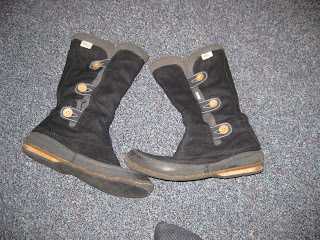Dark Little Story
The last issue of The New Yorker has a dark, uncomfortable Mary Gaitskill story in it. Though most everything she writes has this sense of ick underneath, this one struck me as particularly disturbing. It's about a father who has homicidal tendencies that he's passed on to his little boy. The narrator relates how when he was fourteen..."I started getting excited by the thought of girls being hurt. Or killed. A horror movie would be on TV, a girl in shorts would be running and screaming with some guy chasing her, and to me it was like pron. Even a scene where a sexy girl was getting her legs torn off by a shark--bingo. It was like pushing a button." It's utterly convincing and so you feel like you're getting a peek into the mind of a sociopath who also really wants to be a good father, and really doesn't want his son to have the same lurid attractions. She also makes him seem ordinary in a creepy way. The narrator explains how he lives in two different worlds. The rest of the paragraph does this: "My mom would be in the kitchen making dinner and talking of the phone, stirring and striding around with the phone tucked between her shoulder and her chin. Outside, cars would go by, or a dog would run across the lawn. My homework would be slowly getting down in my lap while this sexy girl was screaming 'God help me!' and having her legs torn off. And I would go invisibly into an invisible world that I called 'the other place. ' Where I sometimes passively watched a killer and other times became one."
Reading the story caused me to look differently at the men around me on the subway. Is he a killer? Is he fantasizing about raping someone and cutting them up into little pieces? Is the guy behind me capable of wrapping a rope around my neck? Because you never know, though those people exist--child molesters and killers and animal torturers. So, does that mean it's good fiction if you carry it into the world around you? Or sensationalistic?
We were talking in the writing class last night about how unfair the publishing world can be; how known names will be taken way before the unknown. A Mary Gaitskill story will certainly be published before one from a student in my workshop, maybe no matter how good they are. But in this case, I think it's because she's an arresting writer--I don't know that I could write something like this and make the character seem human and even sympathetic. If you want to see for yourself, you can find it here. It's called "The Other Place."
And thanks to Leigh Anne for telling me about Portlandia, the new comedy series on IFC starring Fred Armisen and Carrie Brownstein of Sleater Kinney fame. Here's a clip I love:
Reading the story caused me to look differently at the men around me on the subway. Is he a killer? Is he fantasizing about raping someone and cutting them up into little pieces? Is the guy behind me capable of wrapping a rope around my neck? Because you never know, though those people exist--child molesters and killers and animal torturers. So, does that mean it's good fiction if you carry it into the world around you? Or sensationalistic?
We were talking in the writing class last night about how unfair the publishing world can be; how known names will be taken way before the unknown. A Mary Gaitskill story will certainly be published before one from a student in my workshop, maybe no matter how good they are. But in this case, I think it's because she's an arresting writer--I don't know that I could write something like this and make the character seem human and even sympathetic. If you want to see for yourself, you can find it here. It's called "The Other Place."
And thanks to Leigh Anne for telling me about Portlandia, the new comedy series on IFC starring Fred Armisen and Carrie Brownstein of Sleater Kinney fame. Here's a clip I love:


Comments